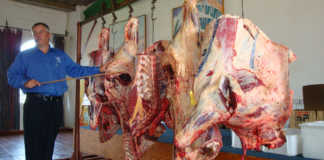
Henceforth Namibia would give preference to the importation of fresh frozen pork from countries where RPPS did not occur. However, fresh frozen pork products would also be allowed in accordance to Article 15.3.3 of the World Organisation for Animal Health (WOAH).
In case of countries where the disease did occur and no disease-free zones existed, imports would only be permitted under special requirements.
READ Understanding African Swine Fever: A lethal threat to pigs
The special requirements called for the pigs to be kept in isolation for a period of 27 days on the export-approved farm where the animals were reared. The pigs also needed to be subjected to an Elisa block test using blood samples taken between days 10 and 15 of the quarantine period.
The animals earmarked for exports to Namibia had to be slaughtered in blocks to prevent cross-contamination from animals from other sources.
According to the official announcement, fresh frozen products not adhering to the protocols as set out by the directorate would be confiscated and sent back to the country of origin or destroyed at the importers’ cost. The importation of cooked and processed pork was not affected by the RPPS protocol.
According to the South African Department of Agriculture, Land Reform and Rural Development (DALRD), it conducted regular surveys to prevent the outbreak of animal diseases such as PRRS.
READ Top pig farmer takes full advantage of technology
“South Africa is one of the few countries that are free from PRRS and surveys are conducted on a regular basis to scientifically prove our free status. Past outbreaks of PRRS have been successfully eradicated by continuous collaborative action between government departments and the industry,” DARLD said on its website.
PRRS, also named blue ear disease, is a widespread disease affecting domestic pigs, according to the WOAH.
The symptoms include reproductive failure, pneumonia and increased susceptibility to secondary bacterial infection. It is caused by a virus classified as a member of the Arterivirus genus. PRRS was first recognised in the US in 1987, and the causative virus was identified in the Netherlands in 1991













